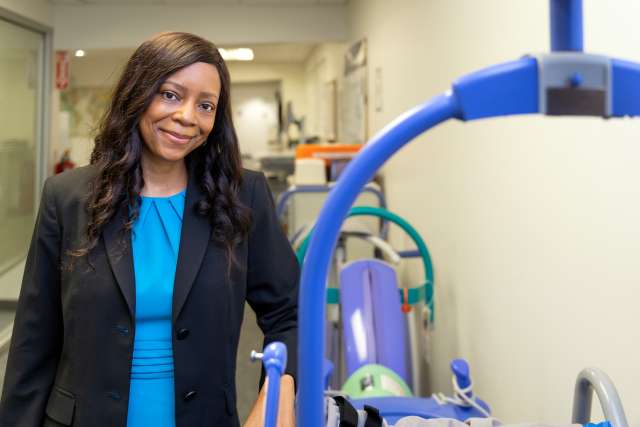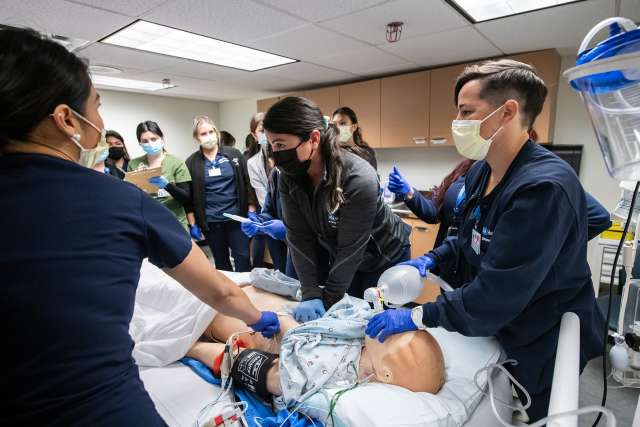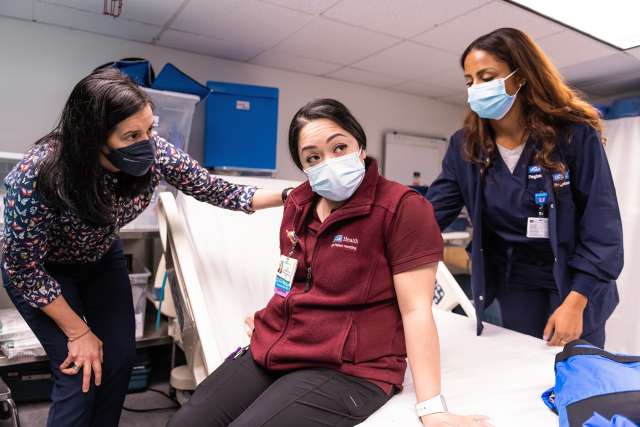Empowering nurses to deliver safe, high-quality care that is grounded in evidence-based practice is at the core of Nursing Professional Development at UCLA Health. That work often begins with the UCLA Health Nurse Residency Program (NRP), which guides the development of new graduates from novice to competent professional nurses in the clinical environment.
In May 2022, the Commission on Accreditation in Practice Transition Programs of the American Nurses Credentialing Center (ANCC) awarded the NRP its Accreditation with Distinction, what many in the field consider to be the gold-seal of excellence for transition-to-practice programs. It is the second time the NRP has received this distinction. Six sites are included in this four-year designation. They are Ronald Reagan UCLA Medical Center, UCLA Santa Monica Medical Center, Resnick Neuropsychiatric Hospital at UCLA, UCLA Westwood Outpatient Surgery Center, UCLA Santa Monica Outpatient Surgery Center and UCLA Health Santa Monica Allergy and Immunology Clinic.
Nurse Residency Program strengths
In its appraisal, ANCC identified the NRP’s three key strengths: strong leadership support and engagement at all levels; an evidence-based practice (EBP) program that demonstrated knowledge, skill and attitude progression among residents presenting EBP projects at national conferences; and a wellness program strategically aligned and supported by the chief nursing officers.
“The accreditation recognizes nursing excellence in programs that transition newly licensed nurses,” says Jessica M. Phillips, MSN, RN, NPD-BC, manager of Nursing Professional Development at UCLA Health. “Nurse residents tell us that they feel supported in their journey.”
The yearlong residency focuses on leadership, patient outcomes and professionalism. Nurse residents meet monthly to support one another and collaborate with experts from multiple populations and nursing areas.
Nurse Residency Program key metrics
Two cohorts of residents complete the program each year. There were 136 residents in the summer 2022 cohort, up from 86 residents last spring. More than 95% of participants complete the program, according to the most recent data, which is above the national average and in line with the program’s goal. Nurse resident satisfaction levels have remained stable and are above the Vizient/ANCC benchmark.
“In the current nursing climate, there are opportunities for improvement in the program to ensure residents have the support they need as they encounter new challenges post-pandemic,” Phillips notes.
“Stress is a major reason nurses leave the profession,” she says. “To address that, one of our goals is to strengthen our wellness and mentorship programs, which have been pivotal to retaining people, as well as helping them to process their experiences and work through difficult situations they’ve encountered.”
Support for evidence-based practice
Evidence-based practice, or EBP, is a problem-solving approach that integrates the best available research with clinician expertise/judgment and patient preferences and values. “EBP is an organizational priority at UCLA Health, and it is fundamental to nursing professional practice,” says Pamela Miller, PhD, RN, ACNP, CNS, PHN, EBP(CH), senior nurse scientist in the Research, Evidence-Based Practice, and Innovation Program in the Center for Nursing Excellence.

“Everything we do for our patients, and in our leadership practices, should be based on evidence from published research and what has been demonstrated as best clinical practice. If there is insufficient evidence to implement a practice change, then nurses conduct research in partnership with PhD-prepared nurse scientists to generate evidence or innovate to create solutions that add to the body of evidence to guide our clinical and leadership practice,” she adds.
Dr. Miller and her team are key players in ensuring EBP is taught throughout nursing. Here are some highlights:
- EBP immersions: five-day workshops for educators, nursing-professional-development specialists, clinical nurse specialists, unit directors, clinical nurse managers and quality-improvement specialists, where participants learn the EBP process and strategies for implementing EBP in the organization;
- Leading EBP workshop: nurse leaders gain knowledge and skills for creating an environment where EBP can be implemented and sustained;
- Implementation strategy session: participants learn evidence-based implementation strategies that facilitate the uptake of best evidence into practice using an implementation sustainability toolkit;
- Nurse residency EBP session: residents are exposed to EBP principles and strategies to apply in their required EBP initiative;
- Leadership fellowship for clinical nurse managers: nurse managers are oriented to their role in EBP and recommended strategies to navigate barriers to creating an environment where EBP can flourish;
- EBP and quality-improvement seminar series with UCLA School of Nursing: showcases EBP and quality-improvement initiatives, conducted either by health system nurses or by Doctorate in Nursing Practice students, to illustrate EBP and quality improvement in action;
- Library partnership: Antonia Osuna-Garcia, UCLA Health and Life Sciences librarian, collaborates to educate nurses on how to develop PICOT (patient, intervention, comparison, outcome, time) search strategies to identify the best evidence to answer practice questions; and
- “U Publish” mentored writing program: provides writing mentorship to support nurses at every level with the knowledge and skills necessary to publish studies, projects or initiatives in peer-reviewed journals that add to the body of knowledge.

In addition, the Center for Nursing Excellence recently hired Lisa Steurer, PhD, RN, CPNP-PC, an evidence-based practice specialist with the Research, Evidence-Based Practice, and Innovation Program, “to help take EBP to new heights,” Dr. Miller says. “I’m excited about UCLA Health Nursing leading the way with evidence-based practices and outcomes. Continuing to build EBP competency among nurses to support evidence translation into practice will have a significant impact on ensuring the highest quality of patient care and safety.”
Jennifer Karmarkar is the author of this article.
